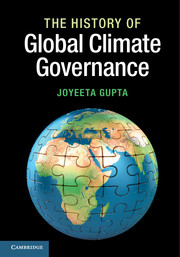10 - Climate governance
A steep learning curve!
from Part 4 - Towards the future
Published online by Cambridge University Press: 05 February 2014
Summary
Introduction
Scholars and policymakers have continually argued that the climate change negotiation process is likely to fail. The first sign was evident when US President George Bush was reluctant in the early 1990s, as representative of one of two OECD countries at the time (the other being Turkey), to adopt the GHG emission stabilization target for 2000, stating further that the US lifestyle was not negotiable. This led to the weakening of the climate target in the Climate Convention. Many in the USA saw the convention as a disappointment (Bodanksy, 1993: 454) and as ‘environmentally flawed’ (Byrd–Hagel Resolution, 1997), because the exemption to developing countries was inconsistent with the need for global action. Subsequent papers predicted that it was most unlikely that a protocol would be adopted at Kyoto; and when the protocol was adopted, that it would not enter into effect. However, the protocol was adopted in Kyoto in 1997 and entered into force in 2005. Although there were high expectations of the Copenhagen COP in 2009, which was to lead to post-Kyoto targets, only a regime of voluntary and conditional commitments emerged. Now that Canada, Russia, Japan and New Zealand have joined the USA in stating that they will not participate in a post-2012 ‘Kyoto’ process, it would appear as if the domino effect has started. The Rio+20 Conference (2012) reminds us that there is a ‘“significant gap” between pledges and what is needed’ and plaintively urges parties to fully implement their commitments. Increasingly there is an expectation that the regime has and will fail (Brand, 2012: 28).
The green and scientific critique is that the convention process is not moving fast enough to address the climate change problem: ‘[Durban] is an unqualified disaster’ and the science and politics are seen as inhabiting ‘parallel worlds’ (Editorial, 2011). The neo-liberal critique is that the centralized, legalized approach of the Climate Convention does not take into account that it could seriously affect the global economy – that the treaty is ‘fatally flawed in fundamental ways’ (White House, 2001). The empiricist critique is that the regime is fragmenting and slow. The climate sceptics argue that the regime is unnecessary.
- Type
- Chapter
- Information
- The History of Global Climate Governance , pp. 193 - 211Publisher: Cambridge University PressPrint publication year: 2014



